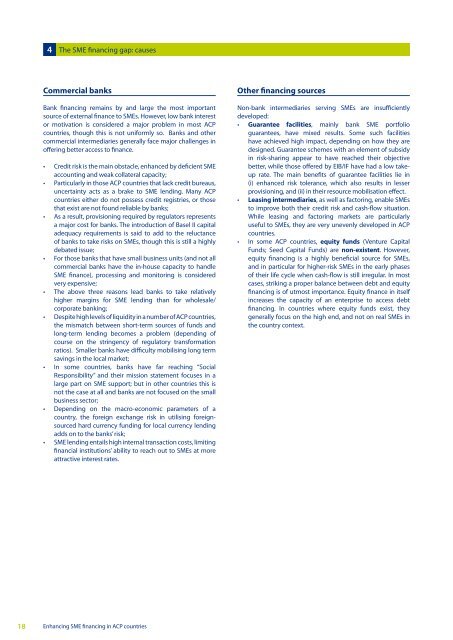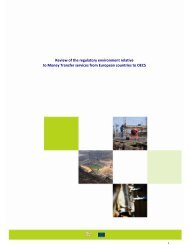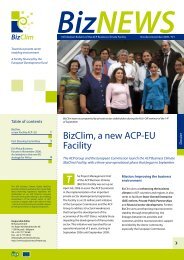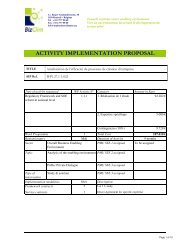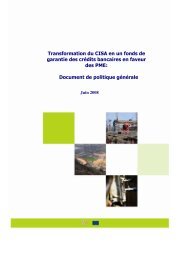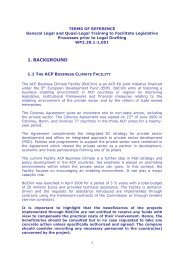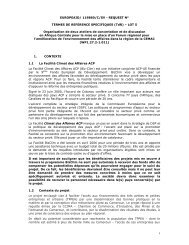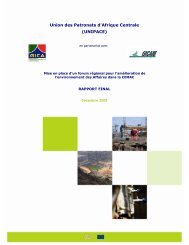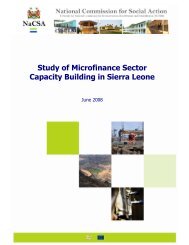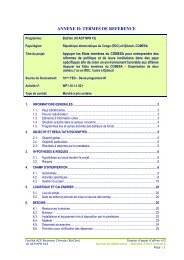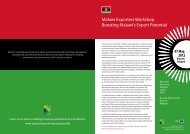Enhancing smE financing in acp countries - ACP Business Climate
Enhancing smE financing in acp countries - ACP Business Climate
Enhancing smE financing in acp countries - ACP Business Climate
You also want an ePaper? Increase the reach of your titles
YUMPU automatically turns print PDFs into web optimized ePapers that Google loves.
4<br />
The sme <strong>f<strong>in</strong>anc<strong>in</strong>g</strong> gap: causes<br />
Commercial banks<br />
Bank <strong>f<strong>in</strong>anc<strong>in</strong>g</strong> rema<strong>in</strong>s by and large the most important<br />
source of external f<strong>in</strong>ance to SMEs. However, low bank <strong>in</strong>terest<br />
or motivation is considered a major problem <strong>in</strong> most <strong>ACP</strong><br />
<strong>countries</strong>, though this is not uniformly so. Banks and other<br />
commercial <strong>in</strong>termediaries generally face major challenges <strong>in</strong><br />
offer<strong>in</strong>g better access to f<strong>in</strong>ance.<br />
• Credit risk is the ma<strong>in</strong> obstacle, enhanced by deficient SME<br />
account<strong>in</strong>g and weak collateral capacity;<br />
• Particularly <strong>in</strong> those <strong>ACP</strong> <strong>countries</strong> that lack credit bureaus,<br />
uncerta<strong>in</strong>ty acts as a brake to SME lend<strong>in</strong>g. Many <strong>ACP</strong><br />
<strong>countries</strong> either do not possess credit registries, or those<br />
that exist are not found reliable by banks;<br />
• As a result, provision<strong>in</strong>g required by regulators represents<br />
a major cost for banks. The <strong>in</strong>troduction of Basel II capital<br />
adequacy requirements is said to add to the reluctance<br />
of banks to take risks on SMEs, though this is still a highly<br />
debated issue;<br />
• For those banks that have small bus<strong>in</strong>ess units (and not all<br />
commercial banks have the <strong>in</strong>-house capacity to handle<br />
SME f<strong>in</strong>ance), process<strong>in</strong>g and monitor<strong>in</strong>g is considered<br />
very expensive;<br />
• The above three reasons lead banks to take relatively<br />
higher marg<strong>in</strong>s for SME lend<strong>in</strong>g than for wholesale/<br />
corporate bank<strong>in</strong>g;<br />
• Despite high levels of liquidity <strong>in</strong> a number of <strong>ACP</strong> <strong>countries</strong>,<br />
the mismatch between short-term sources of funds and<br />
long-term lend<strong>in</strong>g becomes a problem (depend<strong>in</strong>g of<br />
course on the str<strong>in</strong>gency of regulatory transformation<br />
ratios). Smaller banks have difficulty mobilis<strong>in</strong>g long term<br />
sav<strong>in</strong>gs <strong>in</strong> the local market;<br />
• In some <strong>countries</strong>, banks have far reach<strong>in</strong>g “Social<br />
Responsibility” and their mission statement focuses <strong>in</strong> a<br />
large part on SME support; but <strong>in</strong> other <strong>countries</strong> this is<br />
not the case at all and banks are not focused on the small<br />
bus<strong>in</strong>ess sector;<br />
• Depend<strong>in</strong>g on the macro-economic parameters of a<br />
country, the foreign exchange risk <strong>in</strong> utilis<strong>in</strong>g foreignsourced<br />
hard currency fund<strong>in</strong>g for local currency lend<strong>in</strong>g<br />
adds on to the banks’ risk;<br />
• SME lend<strong>in</strong>g entails high <strong>in</strong>ternal transaction costs, limit<strong>in</strong>g<br />
f<strong>in</strong>ancial <strong>in</strong>stitutions’ ability to reach out to SMEs at more<br />
attractive <strong>in</strong>terest rates.<br />
Other <strong>f<strong>in</strong>anc<strong>in</strong>g</strong> sources<br />
Non-bank <strong>in</strong>termediaries serv<strong>in</strong>g SMEs are <strong>in</strong>sufficiently<br />
developed:<br />
• Guarantee facilities, ma<strong>in</strong>ly bank SME portfolio<br />
guarantees, have mixed results. Some such facilities<br />
have achieved high impact, depend<strong>in</strong>g on how they are<br />
designed. Guarantee schemes with an element of subsidy<br />
<strong>in</strong> risk-shar<strong>in</strong>g appear to have reached their objective<br />
better, while those offered by EIB/IF have had a low takeup<br />
rate. The ma<strong>in</strong> benefits of guarantee facilities lie <strong>in</strong><br />
(i) enhanced risk tolerance, which also results <strong>in</strong> lesser<br />
provision<strong>in</strong>g, and (ii) <strong>in</strong> their resource mobilisation effect.<br />
• Leas<strong>in</strong>g <strong>in</strong>termediaries, as well as factor<strong>in</strong>g, enable SMEs<br />
to improve both their credit risk and cash-flow situation.<br />
While leas<strong>in</strong>g and factor<strong>in</strong>g markets are particularly<br />
useful to SMEs, they are very unevenly developed <strong>in</strong> <strong>ACP</strong><br />
<strong>countries</strong>.<br />
• In some <strong>ACP</strong> <strong>countries</strong>, equity funds (Venture Capital<br />
Funds; Seed Capital Funds) are non-existent. However,<br />
equity <strong>f<strong>in</strong>anc<strong>in</strong>g</strong> is a highly beneficial source for SMEs,<br />
and <strong>in</strong> particular for higher-risk SMEs <strong>in</strong> the early phases<br />
of their life cycle when cash-flow is still irregular. In most<br />
cases, strik<strong>in</strong>g a proper balance between debt and equity<br />
<strong>f<strong>in</strong>anc<strong>in</strong>g</strong> is of utmost importance. Equity f<strong>in</strong>ance <strong>in</strong> itself<br />
<strong>in</strong>creases the capacity of an enterprise to access debt<br />
<strong>f<strong>in</strong>anc<strong>in</strong>g</strong>. In <strong>countries</strong> where equity funds exist, they<br />
generally focus on the high end, and not on real SMEs <strong>in</strong><br />
the country context.<br />
18<br />
<strong>Enhanc<strong>in</strong>g</strong> SME <strong>f<strong>in</strong>anc<strong>in</strong>g</strong> <strong>in</strong> <strong>ACP</strong> <strong>countries</strong>


